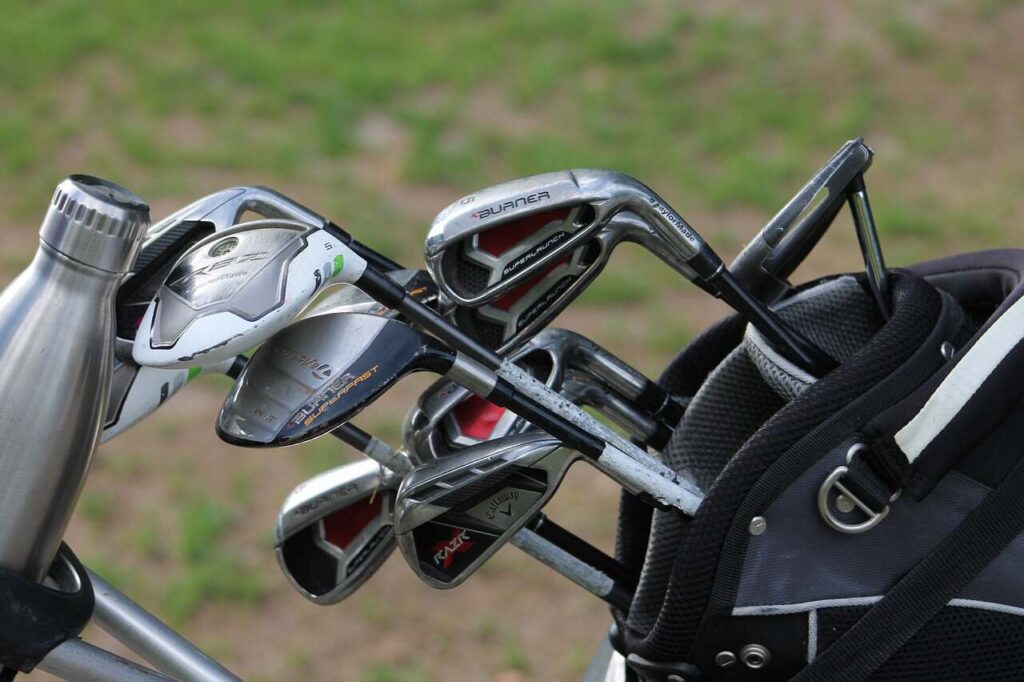Choosing the right golf club is crucial for improving your game and enjoying your time on the course. Whether you’re a beginner or a seasoned golfer, understanding which clubs to use in different situations can make a significant difference in your performance. So, let’s find out how to choose the right golf club.
Table of Contents
Understanding Golf Clubs: Types and Their Uses
Golf clubs can be categorized into four main types: woods, irons, wedges, and putters. Each type serves a specific purpose and is designed to handle different scenarios on the golf course.
Woods: Power and Distance
Woods, often numbered from 1 to 5 (with the 1-wood being the driver), are primarily used for long-distance shots off the tee. They have larger heads and longer shafts compared to other clubs, which allows for greater swing speed and distance. The 3-wood and 5-wood are also common choices for fairway shots when you need distance but a bit more control than the driver.
Irons: Versatility and Accuracy
Irons are numbered from 3 to 9 (with lower numbers corresponding to longer shafts and less loft) and are versatile clubs used for a variety of shots. They are crucial for approach shots to the green and can vary in loft, providing different trajectories and distances. For example, a 7-iron is often used for approach shots due to its balance of loft and distance.
Wedges: Precision and Short Game
Wedges include pitching wedges (PW), gap wedges (GW), sand wedges (SW), and lob wedges (LW). These clubs have higher lofts than irons and are designed for precision shots close to the green or out of hazards. Pitching wedges are typically used for approach shots from fairways, while sand wedges are ideal for getting out of bunkers.
Putters: Control and Accuracy
Putters are essential for the final strokes on the green. They have a flat face and are designed for accuracy and control over short distances. Putters come in various shapes and designs, allowing golfers to choose one that suits their putting style and preferences.
Factors to Consider When Choosing a Golf Club
Selecting the right golf club involves considering several factors that can influence your game and overall experience on the course.
Skill Level and Experience
Your skill level and experience in golf play a significant role in determining which clubs are suitable for your game. Beginners may benefit from clubs that offer forgiveness and are easier to hit, while advanced players may prefer clubs that allow for more control and precision.
Swing Speed and Club Flexibility
The speed at which you swing the club (swing speed) affects the type of club shaft you should choose. Clubs with more flexibility (measured as shaft flex) are suited for faster swing speeds, while stiffer shafts are better for slower swing speeds. Choosing the right flex ensures that you maximize distance and accuracy in your shots.
Course Conditions and Terrain
Consider the conditions of the golf course you typically play on. Factors such as weather conditions, course layout, and terrain (e.g., rough, fairway, bunkers) can impact which clubs you should use. For example, on windy days, you might need clubs that offer more control and stability.
Custom Fitting: Importance and Process
Custom fitting involves tailoring your golf clubs to your unique physical attributes, swing mechanics, and playing style. A professional fitting session can help determine the optimal club specifications, including shaft length, lie angle, and grip size, ensuring that your equipment enhances rather than hinders your performance.
Tips for Testing and Choosing the Right Golf Club
Testing golf clubs before making a purchase is essential to ensure that they meet your expectations and complement your playing style.
Try Before You Buy: Testing Clubs
Before purchasing golf clubs, try them out on the driving range or during a round of golf. Pay attention to how each club feels in your hands, the sound it makes upon impact, and how the ball responds to your swing. Testing allows you to assess which clubs best suit your swing and preferences.
Consulting with Experts: Professional Advice
Seek advice from golf professionals or club fitters who can provide personalized recommendations based on your skill level, swing characteristics, and goals. They can suggest specific brands and models that align with your playing style and help you achieve your desired performance outcomes.
Reading Reviews and Comparisons
Researching online reviews and comparisons of different golf clubs can provide valuable insights into their performance, durability, and suitability for various playing conditions. Reading user experiences and expert opinions can help you narrow down your choices and make an informed decision.
Final Thoughts
Choosing the right golf club involves understanding your individual needs, considering various factors such as skill level, swing speed, and course conditions, and testing clubs to find the perfect fit. By investing time in selecting the right equipment, you can enhance your performance, enjoy your time on the course, and ultimately improve your overall golfing experience.
FAQs: How to Choose the Right Golf Club
How many types of golf clubs are there?
There are four main types: woods, irons, wedges, and putters, each serving different purposes on the course.
What is the importance of custom fitting?
Custom fitting ensures that your golf clubs match your physical attributes and playing style, optimizing your performance.
How do I know which golf club is right for my skill level?
Consider your experience and proficiency in the game; beginners may benefit from clubs that offer forgiveness and ease of use.
Why is testing golf clubs important?
Testing allows you to feel how a club performs in different situations, helping you make an educated decision before purchase.
Can weather conditions affect club selection?
Yes, factors like wind or course conditions can influence which clubs you should use to adapt to varying circumstances.



